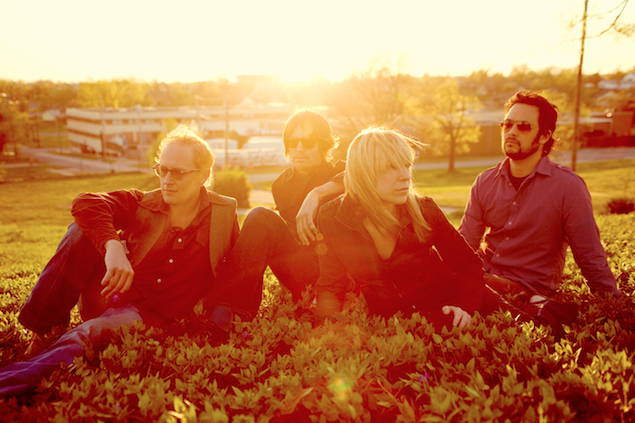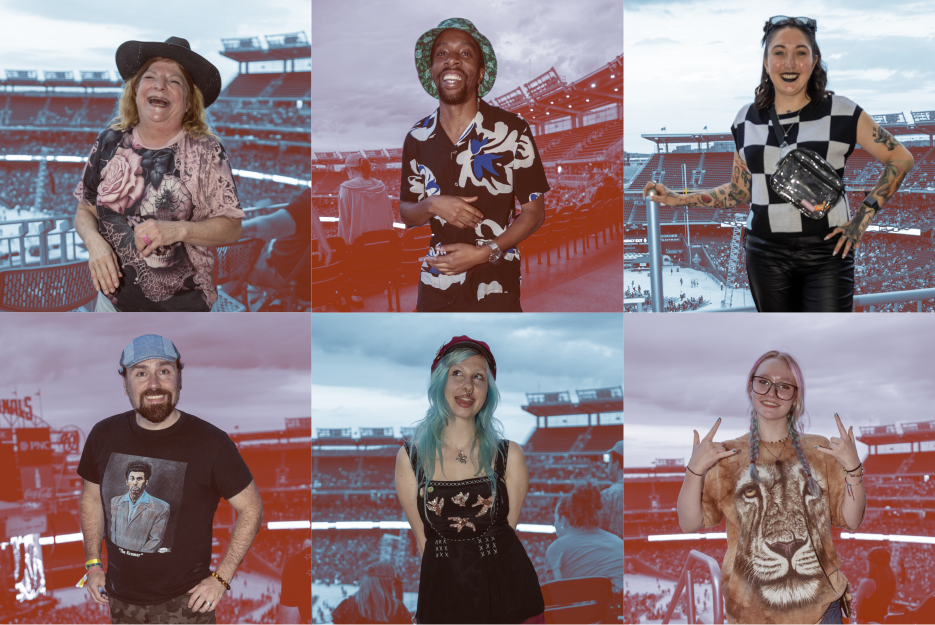If you’re a fan of rootsy, soulful rock à la Black Keys, or the erstwhile TV show Friday Night Lights, you’re likely familiar with Heartless Bastards. The four-piece—currently comprising drummer Dave Colvin, bassist Jesse Ebaugh, guitarist Mark Nathan, and frontwoman Erika Wennerstrom—started out in Cincinnati, Ohio, but are now based in Austin, Texas. Their fourth album, Arrow, came out on Valentine’s Day of this year.
Before the band’s show at Black Cat tonight, we spoke with Wennerstrom about filming for TV, her least favorite part of performing, and not recognizing her own music.
What do you guys do on the road?
Aside from being in the club and sound check, it’s an average of three to ten hours of commuting. In the van, everybody does their own thing. I read quite a bit, and I get movies out of that Red Box thing that’s around these days. I have a feeling I’ll be doing more of that since Daylight Savings Time is gonna hit through the tour. There’s not a whole lot of conversation in the van—somebody’s got headphones on, somebody might be playing some kind of computer video game, Dave and Jesse sit up front and listen to football and baseball on satellite and NPR.
Have you guys played at the Black Cat before? Do you prefer a venue like that as opposed to big arena-type stages?
We played there once in 2008, in the fall; we did a tour with Langhorne Slim. I don’t think we’ve ever played an arena; we opened for Wilco in Pittsburgh once, but not in a full-size arena. I like different kinds of venues. I tend to find theaters sound better versus an arena kind of thing. I like festivals because generally they have nice outdoor sound systems, and you’re playing with a bunch of other bands, so it’s fun to be able to catch some additional bands. At this point of the band being together for ten years, you run into other musicians you know, so it’s kind of fun to see a different face in a different place. Sometimes we play a smaller venue in Austin—we’ll play the Continental Club for fun, and it’s a bit small for us but it’s got a great vibe to it. Sometimes I find sit-down theaters can take away some live energy, because there’s a gap before the seats start, and if a lot of the audience is sitting, they feel like you’re farther away. But Continental, if you play there, people are a foot from you, and there’s something about people huddled there that gives you a lot of extra energy.
Do you ever get stage fright?
A little bit. I feel like as far as playing our set, I’ve been playing live for so long that I feel like my stage fright is less [to do with] the performance itself and more being at a loss for words. It depends on the mood I’m in—how comfortable I feel being vocal with the audience . . . sometimes you’re in more of a talkative mood than others. But I want them to know I appreciate they’re there.
Do you have any pre-show rituals?
Not really. I might drink a glass of wine, and Jesse and Mark drink whiskey, but that’s about it. Pre-show we’re usually watching the opening band if we’re headlining.
You released your fourth album this year. When you go back and listen to songs from your first album, say, is it like seeing old photos of yourself?
I never go back and listen to my albums. It’s been funny—a couple times I’ve walked into a bar and maybe there’s people and commotion going on, but I hear the song and think, “That’s so familiar,” and then I realize I’m hearing myself. It’s happened several times. We still play quite a few songs from older albums live, and they’ve morphed over the years with different members playing, so if I happen to hear one of the older songs but from the album version it takes a minute to recognize that it’s Heartless Bastards.
Do you think your sound changes or evolves from album to album?
I feel like when I was younger, I was listening to all kinds of new bands, and I still listen to a bit of new music, but more and more I know exactly what I like. As a younger adult I was checking out all of these different things; now I feel more attuned to what I know I want to get across musically [although] I’m still very proud of songs I wrote ten years ago. In a way the band has grown, and a lot of it has to do with figuring how to take the sounds in your head and figure out how to work with a band on them and to get the song across in a recording the way you want it to be. Sometimes those ideas change while you’re working on it, like somebody plays something and it takes it in a different direction, a direction you get excited about. For me I feel like I’ve got this little invisible thing in front of me and I’m following it wherever it goes—musically and in life.
The band roster has changed a few times over the years. Do you think that’s made it more difficult to consistently achieve the sound you want?
I feel like it’s gotten easier, actually. I’ve been working with this band now for four years, and we’re all pretty in tune with each other; it’s been very easy to communicate. I find it to be less and less challenging, and maybe in the past I’ve had a tough time articulating my ideas, but maybe I’m becoming a better communicator. I find it to be quite easy to work on songs with them.
What’s your songwriting process?
Generally it starts with me getting a melody in my head; I carry it around with me, and I tell myself if I don’t forget it, it’s probably a pretty good idea. Then I’ll pick up a guitar and try to figure out a good key, and sometimes the changes are already there, sometimes I need to figure out the changes in the songs. Then I put it together and bring it in to the band, and it’s gonna morph a bit there, too. I explain some influences and a direction I’d like to go in, and everybody creates their own part within that, or they’ll try something else altogether. We all work on it together and figure it out.
What do you absolutely have to have around you when you’re writing songs?
The only thing I definitely find is that I like to be alone, because when I’m first working an idea out I’m trying to figure out if I even like it. I’m a bit self-conscious about having people hear things when I’m not quite sure how I feel about them, so it’s mostly about being alone when I work out the idea just to make sure I feel good about it before I bring it in. I’ve brought in songs to the band early and then we spend time on it and I decide that I don’t like it as much as I thought, so I also don’t wanna waste anybody’s time but my own—I mean, it’s never a waste, it’s all just figuring stuff out.
The band was featured performing in a season four episode of Friday Night Lights—can you tell me how that came about?
They’ve been really supportive of the band—they had a song from our second album at the intro of the second episode, and after the last album they invited us on to play. It was a really fun experience; they set us up in Emo’s in the outdoor area between indoor and outdoor—where we played isn’t actually a venue—and they got beer with food coloring and passed it around to everybody. It ended up being one of the hottest days of the year, about 106 degrees when we filmed, and I didn’t bother touching up makeup ’cause you sweat it all off in about 30 seconds. Also they taped our performance live—they had dialogue and we were in the background, so after we recorded the version for the show, they had us sync with the same song. So the audience is dancing around to silence and we’re pretending to play and the actor and actress are speaking dialogue over it, so everybody’s pretending to dance and we just hear the dialogue. We had about three takes of that.
We were really excited to be a part of the show; they film locally in Austin, and it was a really neat thing. A lot of people have come up to us to talk about it; we saw Colin [Meloy] from the Decemberists, and he told me that was one of his favorite shows.
Who do you listen to in your spare time?
I have a Dr. John album on rotation in my car a lot. I’m actually listening to a Vetiver album from 2006—I listened to that quite a bit on the road trip. You know who I saw live—at this festival in Dallas, I saw Portugal the Man, but I don’t have any of their albums. I’m always a fan of Thee Oh Sees . . . they’re starting to get more known recently, but I’ve been a fan of them for about ten years.
Making it big as a band requires a certain degree of self-promotion—doing interviews, for instance. Do you have a least favorite part of that aspect of being a performer?
I find interviews to be very difficult, only because I don’t find myself . . . it depends on the day, but a lot of days when I don’t feel very articulate, especially with radio interviews and stuff. I went in to do one for NPR and sort of froze up; I listen to it quite a bit and was like, “Wow, I’m at NPR,” and got nervous. They didn’t end up airing the interview. It really depends on the day and how comfortable I feel doing them.
What should people expect from your live show?
I think people tend to have a good time. We’re having a good time up there; we don’t have a crazy light show or anything, but I’d like to think the music and the energy of our performance is enough to present people a good show.
Heartless Bastards perform at Black Cat Tuesday, October 30, at 8. Tickets ($15 in advance, $17 at the door) are available through the venue’s website.
















